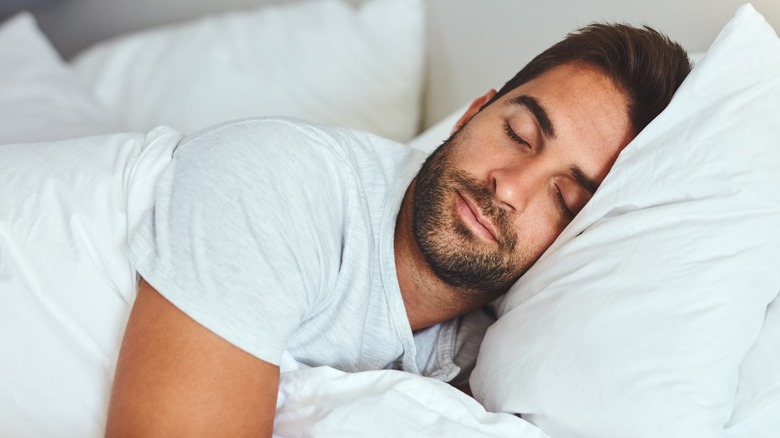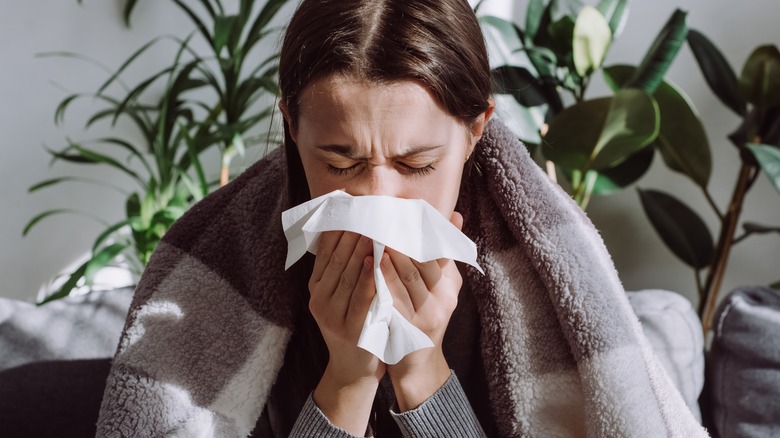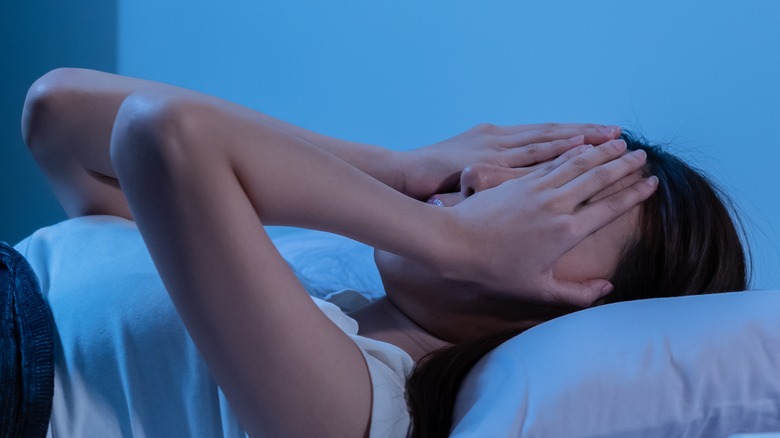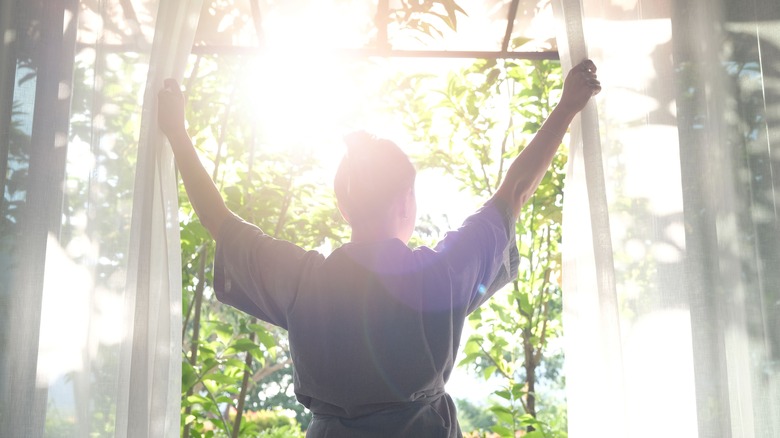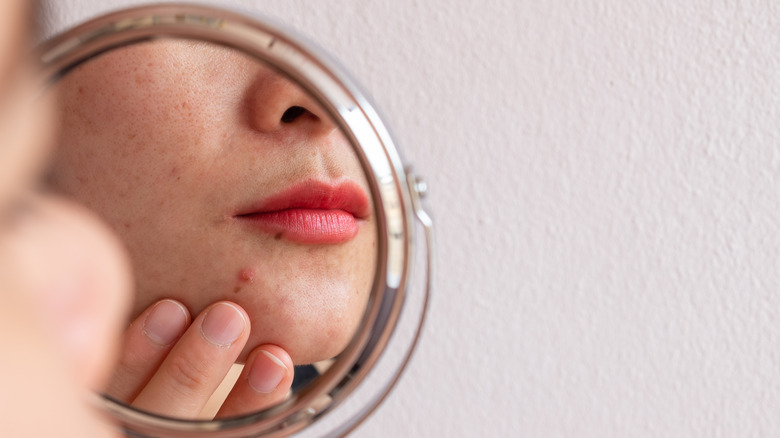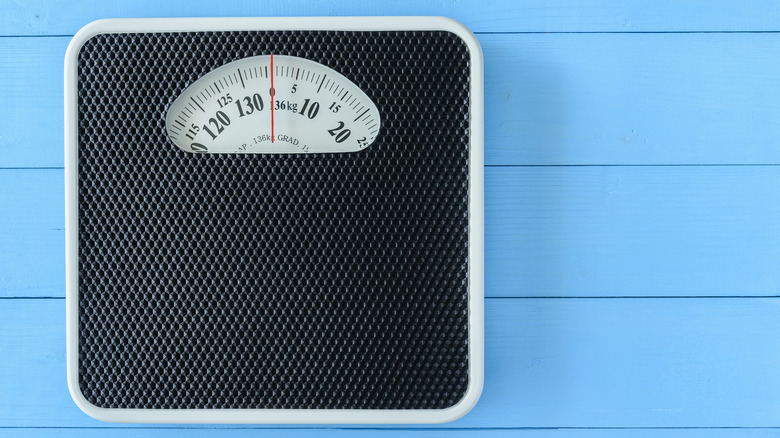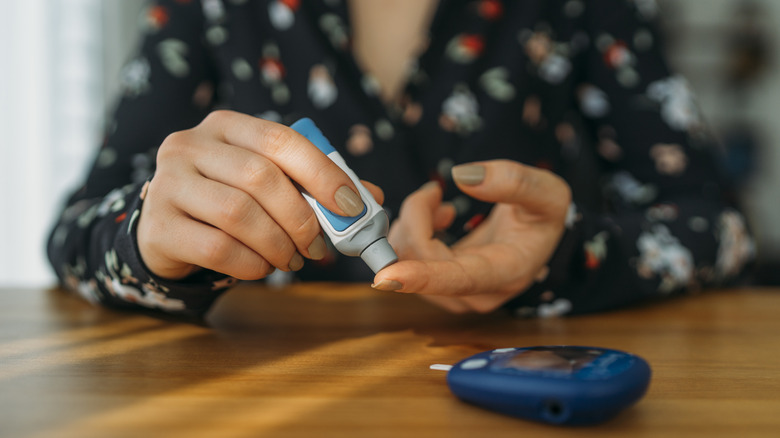What Happens To Your Body When You Go To Bed Early Every Night
Should one go to bed early every night? At first, this might seem like a simple yes-or-no question.
Per experts, adults from ages 18 to 60 should generally aim for seven or more hours of sleep every night. So, an earlier bedtime might help one reach this goal. Moreover, as Dr. Matt Walker, head of the Sleep and Neuroimaging Lab at the University of California, Berkeley, told Time, "The time of night when you sleep makes a significant difference in terms of the structure and quality of your sleep." Typically, when we sleep, we experience both non-rapid eye movement (non-REM) sleep and REM sleep during our sleep cycles, but according to Dr. Walker, the non-REM/REM ratio tends to be in non-REM sleep's favor during the early part of the night. So, turning in later could mean getting less non-REM sleep. But turning in early isn't always an option. For example, there's shift work, which has been associated with various health problems. Plus, as board-certified sleep psychologist Dr. Jade Wu notes on her website, an early bedtime might be particularly challenging for night owls.
In reality, there are many factors to consider when choosing the right bedtime. We'll be exploring some of the potential impacts turning in early can have on your health and problems that can occur from oversleeping.
It might give your immune system a boost
One advantage of going to bed earlier involves your ability to ward off infections. Writing for the Mayo Clinic, Dr. Eric J. Olson notes that the immune system releases proteins called cytokines while you sleep. These cytokines are vital to your health, whether or not you're sick. When you're well, cytokines act as chemical messengers to other cells to maintain proper immune system function; when you're ill, cytokines relay messages to your immune system, depending on the kind of threat your body is facing (per Cleveland Clinic). Moreover, some cytokines actually help with sleep. According to Dr. Olson, not getting enough sleep can negatively affect your body's cytokine production, as well as the number of cells and antibodies in your body that help ward off infections.
Although experts recommend that adults generally try to get seven to eight hours of sleep per night, sleeping more than that can have its drawbacks, too: Oversleeping has been linked to diminished quality of sleep, as well as difficulties in falling asleep.
It could lead to insomnia
Morning larks or early birds are people who are naturally inclined to go to bed early and get up early. Conversely, night owls tend to be full of energy at night. Unsurprisingly, turning in early for a night owl can be a challenge.
Board-certified sleep psychologist Dr. Jade Wu states on her website that she's had patients who have developed chronic insomnia because they tried to " ... go to bed early ... only to end up laying there, sleepless and frustrated because their brains were wide awake and restless." According to Dr. Wu, these patients began questioning if their problems falling asleep at this earlier time was a sign that something was wrong with them (specifically with their sleep biology). This made it even harder to fall asleep, which is why they developed chronic insomnia.
Dr. Wu recommends avoiding certain pitfalls when it comes to setting a bedtime. For example, a married couple might consist of a morning lark and a night owl. While the night owl might feel compelled to go to bed at the same time as the morning lark, it might be better for the night owl to create a restful, screen-free environment to wind down. This will encourage the night owl to naturally become tired, and once that happens, they should go immediately to bed.
It might have a beneficial impact emotionally
Can going to bed earlier help one emotionally? A 2021 study in JAMA Psychiatry that involved 840,000 people found a correlation between bedtime and an increased likelihood of depression. While those who hit the sack at 10 p.m. and slept for seven hours were 23% less likely to experience depression, those who turned in at midnight and slept for seven hours were 23% more likely to experience depression. Psychology Today noted that while this study suggests a possible link between an earlier bedtime and a reduced risk of depression, there are other factors to consider.
While the study found that those genetically hardwired to get up early were at lower risk of depression, if someone is already going to bed early and getting up early, going to bed even earlier might not lead to that person becoming happier. Moreover, while an earlier bedtime could help reduce depression in some individuals, they would have to maintain that new sleep schedule. Also, how much sunlight a person gets may impact their emotions. So, if your emotions are low when you first wake up, basking in the warmth of the morning sun might help.
If you or someone you know needs help with mental health, please contact the Crisis Text Line by texting HOME to 741741, call the National Alliance on Mental Illness helpline at 1-800-950-NAMI (6264), or visit the National Institute of Mental Health website.
It can help keep your skin healthy
Have you ever noticed that your skin seemed to look better after a particularly good night's sleep? As it turns out, going to bed an hour earlier can give your skin a healthy glow. What's more, a lack of sleep can actually have a negative impact on one's skin's health.
Lack of sleep can cause various issues, like dark circles under the eyes. However, a person's skin can also appear less rosy when they aren't sleeping enough. As Water's Edge Dermatology explains, a lack of sleep can lead to reduced blood flow to the skin and a paler complexion. Moreover, certain hormones are at play while you sleep. For example, somatotropin (human growth hormone or hGH) helps your skin in several ways, including repairing it and helping it appear plump. Since the body starts secreting hGH after you drift off, not getting enough sleep can affect the health and appearance of your skin. Plus, missing out on sleep can lead to the body producing more of the so-called "stress hormone," cortisol, which can cause skin problems like acne.
It might help with weight management
When it comes to sleep and obesity, there is a bit of a chicken-and-egg scenario, per Scientific American. Reena Mehra, an associate professor of medicine who studies sleep and health at Case Western Reserve University School of Medicine, told Scientific American that a "bidirectional relationship" may exist between the two.
Yale Medicine endocrinologist Dr. Brian Wojeck noted on the University's website that not getting enough sleep can throw off key hormones (leptin and ghrelin) that are connected to one's appetite. Leptin, which makes one feel satiated, is released from body fat. Meanwhile, the stomach is the primary source of ghrelin, which signals hunger to the brain (via Cleveland Clinic). The body's levels of leptin go up while one sleeps. When a person isn't sleeping enough, that can lower leptin levels. Plus, sleep disruption can cause the body's ghrelin levels to rise. The end result is less of the hormone that makes you feel full and more of the hormone that increases your hunger, making you more likely to want to eat more.
In addition, not enough sleep can result in increased production of cortisol, which could lead to more fat storage. So, if going to bed earlier helps you get the right amount of sleep, it might also help you avoid these weight-affecting hormone fluctuations.
It might reduce your chances of developing type 2 diabetes
According to the CDC, not getting enough sleep can raise one's chances of developing type 2 diabetes. Regardless of the type of diabetes one has, insulin is a major factor, since it allows your cells to take in blood sugar. For type 2 diabetics, however, their cells have become insulin-resistant, which means they aren't taking in blood sugar as they should.
Typically, the pancreas produces more insulin when it detects more sugar entering the bloodstream. But if the pancreas has to constantly release large amounts of insulin, this can result in insulin resistance, which can lead to elevated blood sugar levels and, eventually, type 2 diabetes. And not sleeping enough can make a person more likely to have increased insulin resistance.
In addition, if a person is diabetic and gets less than seven hours of sleep a night on a regular basis, it can become harder to manage their diabetes. For example, one is more likely to want foods that are high in sugar and carbs if they don't get enough sleep.
It likely has a major impact on heart health
Going to bed earlier could lead to oversleeping, which has been connected to various health issues, including heart disease (via Johns Hopkins Medicine). Perhaps more importantly, however, the CDC notes that not getting the right amount of sleep regularly can actually raise the likelihood of heart disease.
A 2021 study involved researchers tracking more than 88,000 adults over a roughly six-year period. Among the participants, 3,172 experienced cardiovascular events (e.g., heart failure, heart disease, or stroke). The data showed that those who fell asleep at either midnight or after midnight were the most likely to experience these. On the other hand, the group who experienced such heart-related health problems the least fell asleep anywhere from 10 to 10:59 p.m.
Although the study pointed to a later bedtime as possibly bad for one's heart, there were also negative findings about going to sleep too early. While women were more likely to have heart issues if they fell asleep later, men who fell asleep before 10 p.m. were more likely to have heart health problems. With that said, neuroscientist and study co-author David Plans clarified that causation could not be concluded based on the study results (via NBC).

